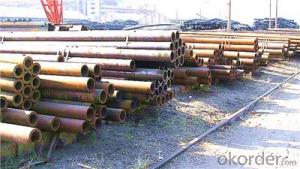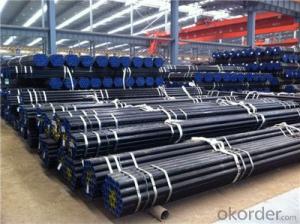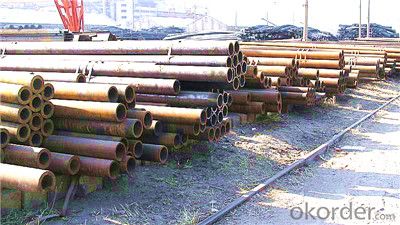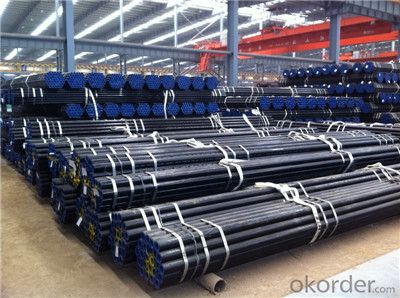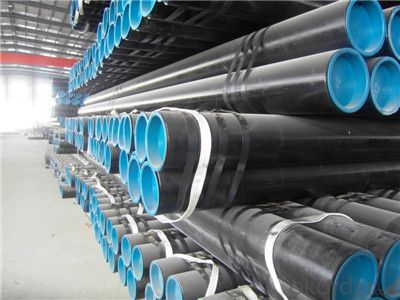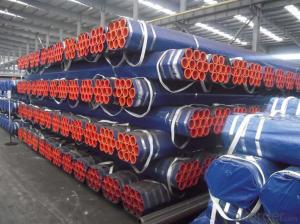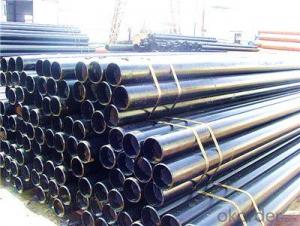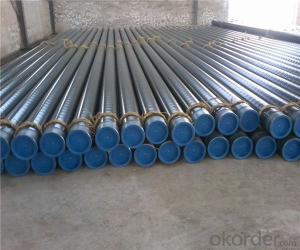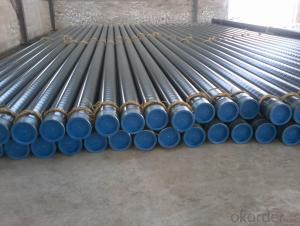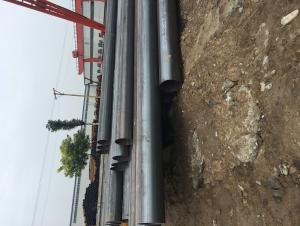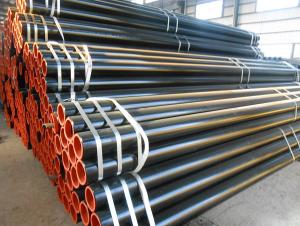Seamless Steel Pipe with Reasonable Price
- Loading Port:
- Tianjin
- Payment Terms:
- TT OR LC
- Min Order Qty:
- 50 m.t.
- Supply Capability:
- 2000000 m.t./month
OKorder Service Pledge
OKorder Financial Service
You Might Also Like
PRODUCT DETAILS
1.Structure of Seamless Steel Pipe Description:
A large amount of Seamless Steel Pipes is offered to the clients at cost effective rates. These pipes are extremely durable, resistant to corrosion and have high tensile strength. Our pipes are used in nuclear plants, power plants, refineries and construction industry across the country. Furthermore, we are capable of providing these seamless pipes to the clients in bulk quantity.
2.Main Features of the Steel Pipe:
• High manufacturing accuracy
• High strength
• Small inertia resistance
• Strong heat dissipation ability
• Good visual effect
•Reasonable price
3.Seamless Steel Pipe Specification:
| Standard: | GB, DIN, ASTM,ASME, ASTM A106-2006, ASTM A53-2007 |
| Grade: | 10#,20#, 45#, 16Mn |
Thickness: | 8 - 33 mm |
| Section Shape: | Round |
| Outer Diameter: | 133 - 219 mm |
| Place of Origin: | Shandong, China (Mainland) |
| Secondary Or Not: | Non-secondary |
| Application: | Hydraulic Pipe |
| Technique: | Cold Drawn |
| Certification: | API |
| Surface Treatment: | factory state or painted black |
| Special Pipe: | API Pipe |
| Alloy Or Not: | Non-alloy |
| Length: | 5-12M |
| Outer Diameter: | 21.3-610mm |
4.Product pictures
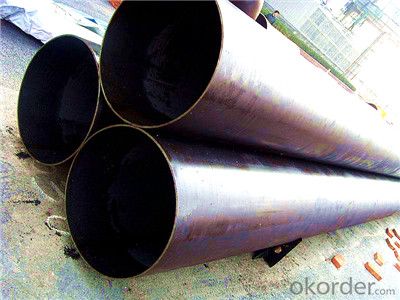
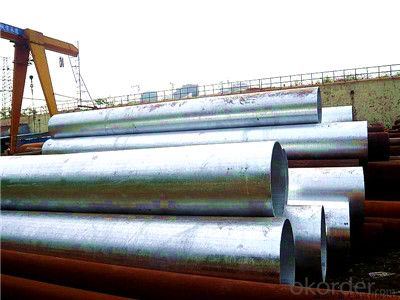
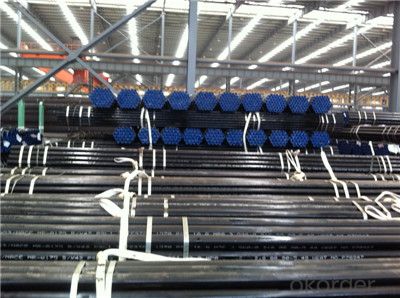
5.FAQ of Seamless steel pipe:
①How is the quality of your products?
Our products are manufactured strictly according to national and internaional standard, and we take a test
on every pipe before delivered out. If you want see our quality certifications and all kinds of testing report, please just ask us for it.
Guaranteed: If products’ quality don’t accord to discription as we give or the promise before you place order, we promise 100% refund.
②How about price?
Yes, we are factory and be able to give you lowest price below market one, and we have a policy that “ for saving time and absolutely honest business attitude, we quote as lowest as possible for any customer, and discount can be given according to quantity”,if you like bargain and factory price is not low enough as you think, just don’t waste your time.Please trust the quotation we would give you, it is professional one.
Any question, pls feel free to contact us !
- Q: How are steel pipes protected against galvanic corrosion?
- Steel pipes are protected against galvanic corrosion through the use of sacrificial anodes, coatings, or the application of electrical currents. These methods create a barrier or redirect the corrosion process, preventing the steel pipes from deteriorating due to galvanic reactions.
- Q: What are the advantages of using pre-fabricated steel pipes?
- There are several advantages of using pre-fabricated steel pipes in various applications. Firstly, pre-fabricated steel pipes offer a high level of durability and strength. Steel is known for its robustness and resistance to external forces, making it an ideal material for constructing pipes that need to withstand high pressure or heavy loads. This durability ensures that pre-fabricated steel pipes have a longer lifespan compared to other materials, reducing the need for frequent replacements and maintenance. Secondly, pre-fabricated steel pipes provide excellent corrosion resistance. Steel pipes are often coated with protective layers, such as galvanization or epoxy, which prevent rusting and corrosion. This corrosion resistance is particularly crucial when the pipes are used in industries or environments where they may come into contact with moisture, chemicals, or other corrosive substances. By utilizing pre-fabricated steel pipes, the risk of leaks, deterioration, or failure due to corrosion is significantly reduced. Another advantage of pre-fabricated steel pipes is their versatility and ease of installation. These pipes are manufactured to precise specifications before being delivered to the site, allowing for quick and efficient installation. Their modular nature means that they can be easily assembled, disassembled, and reconfigured as needed, making them suitable for a wide range of applications, from industrial settings to residential construction. Moreover, pre-fabricated steel pipes can be easily integrated with other building components, such as fittings, valves, and connectors, ensuring a seamless connection and reducing installation time and costs. Furthermore, pre-fabricated steel pipes are more environmentally friendly compared to other materials. Steel is a highly recyclable material, and using pre-fabricated pipes reduces the consumption of natural resources and energy required for their production. Additionally, the long lifespan of steel pipes reduces waste generation and the need for frequent replacements, further contributing to sustainability efforts. Lastly, pre-fabricated steel pipes offer cost advantages. While the initial cost of steel pipes may be higher than some other materials, their durability and low maintenance requirements result in long-term cost savings. The reduced need for repairs, replacements, and maintenance, as well as the ease of installation, translates into lower overall project costs and reduced downtime. In summary, the advantages of using pre-fabricated steel pipes include durability, corrosion resistance, versatility, ease of installation, environmental friendliness, and cost-effectiveness. These benefits make pre-fabricated steel pipes a preferred choice for various industries and applications.
- Q: How long is the seamless tube?
- Seamless steel tube specification: 8-1240 * 1-200mm
- Q: What connections are there for concrete filled steel tubular column foundations?
- Application of double beam connection node usually uses "I" shape columns and steel bracket which is around the construction technology of a modern steel concrete column girder casting formed in the steel pipe outside through the two structures, the bearing pin four axis and four angles on the common components of stress transfer. The construction technology in the application is usually used at both ends of the stress transfer construction mode, through the four steel bracket to the corresponding shear stress, avoid crack width because the node contact produces clear, delayed cracks, improve anti cracking ability of regional nodes.This node model in the connection when the longitudinal reinforcement without through the tube, without bending the construction can be carried out directly, with easy construction technology, construction control difficulty, the economic benefits of construction at the same time, the advantage of low reinforcement to save. In this joint engineering technology, the key pride is to control the stress transfer of steel bracket.
- Q: What does "SC50" steel pipe mean in civil engineering?
- The corrosion resistance of Ni is very strong in acidic environment. In the environment containing sulfuric acid or hydrochloric acid, the higher the content of Ni in the welded pipe is, the stronger corrosion resistance is. In general circumstances, the addition of Cr in a T-junction steel pipe prevents erosion. The marginal condition of the steel strip is another important cause of the wrong edges. The influence of mass flow rate, heat flux density and structural parameters (ratio of spiral curvature diameter and diameter of T-shape welded tube Dc/D) on heat transfer coefficient of saturated bubble boiling in vertical helical tubes.
- Q: Can steel pipes be used for paper mills?
- Yes, steel pipes can be used for paper mills. Steel pipes are widely used in various industries, including paper mills, due to their durability, strength, and resistance to corrosion. These pipes are commonly used for transporting water, chemicals, steam, and other fluids within the paper mill facilities.
- Q: Are steel pipes suitable for industrial applications?
- Yes, steel pipes are highly suitable for industrial applications. Steel pipes offer several advantages that make them the preferred choice for various industries. Firstly, steel pipes have excellent strength and durability, making them capable of withstanding high pressure and heavy loads. This makes them ideal for applications involving transportation of liquids, gases, and solids. Additionally, steel pipes have a high resistance to corrosion, which is crucial in industrial environments where exposure to harsh chemicals, moisture, and extreme temperatures is common. The corrosion-resistant properties of steel pipes ensure a longer lifespan and reduce the need for frequent maintenance and replacements. Moreover, steel pipes have a smooth interior surface, which minimizes friction and allows for efficient flow of materials. This is especially important for industries such as oil and gas, where the smooth flow of fluids is essential for proper operations. Furthermore, steel pipes are available in a wide range of sizes and thicknesses, allowing for customization and flexibility in design. They can be easily welded and connected, enabling easy installation and modification as per the specific requirements of industrial applications. Overall, steel pipes offer a combination of strength, durability, corrosion resistance, and versatility, making them highly suitable and widely used in various industrial applications such as oil and gas, construction, water treatment, power generation, and chemical processing.
- Q: How are steel pipes protected against electromagnetic interference?
- Steel pipes can be protected against electromagnetic interference by using a variety of methods such as shielding, grounding, and insulation. Shielding involves wrapping the pipes with a conductive material, like copper or aluminum, which acts as a barrier to block electromagnetic waves. Grounding ensures that any stray electrical charges are safely directed away from the pipes, reducing the risk of interference. Insulation, such as coatings or sleeves, can also be applied to prevent direct contact between the pipes and potential sources of electromagnetic interference.
- Q: What is the impact resistance of steel pipes?
- The impact resistance of steel pipes is quite high due to the inherent properties of steel as a material. Steel is known for its strength and durability, which makes it able to withstand significant external forces and impacts without deforming or breaking. The impact resistance of steel pipes is further enhanced by their construction and design. Steel pipes are typically made using various manufacturing techniques such as seamless or welded construction, which ensures uniformity and strength throughout the pipe structure. This construction process eliminates weak points or seams that could compromise the impact resistance of the pipe. Moreover, steel pipes can be engineered to meet specific requirements for impact resistance based on the intended application. Different grades and types of steel can be used to achieve varying levels of impact resistance, allowing for customization to suit different industries and environments. The high impact resistance of steel pipes is particularly advantageous in industries such as construction, oil and gas, and transportation, where pipes are subjected to heavy loads, pressure, and potential impacts. Steel pipes can withstand these conditions, making them a reliable choice for various applications. In summary, the impact resistance of steel pipes is excellent due to the inherent strength and durability of steel as a material, as well as the construction techniques used in their manufacturing. Steel pipes can withstand significant external forces and impacts, making them a reliable and robust choice for a wide range of industries and applications.
- Q: How are steel pipes used in the chemical processing industry?
- Steel pipes are used extensively in the chemical processing industry as they offer superior strength, durability, and resistance to corrosion. These pipes are used to transport various chemicals, including acids, alkalis, and solvents, throughout the processing plants. They are also utilized for conveying gases, steam, and liquids under high pressure and temperature conditions. Furthermore, steel pipes are employed in the construction of chemical reactors, heat exchangers, and storage tanks, ensuring the safe and efficient operation of chemical processes.
Send your message to us
Seamless Steel Pipe with Reasonable Price
- Loading Port:
- Tianjin
- Payment Terms:
- TT OR LC
- Min Order Qty:
- 50 m.t.
- Supply Capability:
- 2000000 m.t./month
OKorder Service Pledge
OKorder Financial Service
Similar products
Hot products
Hot Searches
Related keywords
